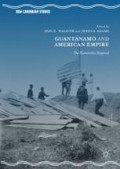Abstract
Approaching the U.S. naval base at the Guantánamo Bay as a site of conscience for the Caribbean region, this chapter juxtaposes first-hand accounts of the Battle of Guantánamo in 1898; the U.S. State Department’s elimination of Haitians’ right to sanctuary in the following decade; and U.S. policy towards Haitian asylum seekers in the aftermath of its endorsement of the Protocol Relating to the Status of Refugees in 1968. Walicek considers longitudinal patterns associated with the U.S. government’s use of the base to achieve certain foreign policy goals in Haiti, as well as related discriminatory practices involving Haitian asylum seekers in the 1970s. He shows that the origins of shameful anti-asylum policies targeting Haitians in the second half of the twentieth century can be traced to U.S. diplomats’ concerns about how asylum policy functioned within Haiti’s borders in the later nineteenth century. Changes to this policy, which consisted of the elimination of protection for Haitian nationals, were instituted in 1908 with military support from Guantánamo Bay. Grounded in the humanities’ commitment to the critical assessment of debates about justice and international conflict, this chapter shows that humanitarian concerns seldom informed U.S. policies towards Haitians who voiced fears of violence and persecution, even in the face of evidence that their claims were credible. Its final part presents the work of Haiti’s ‘freedom culture’ artists as a model for rethinking the history of Guantánamo Bay.
Bay kou bliye, pote mak sonje.
He who gives the blow forgets; he who carries the scar remembers. —Haitian Proverb
Bibliography
Anker, Deborah. “U.S. Immigration and Asylum Policy: A Brief Historical Perspective.” Defense of the Alien 3 (1990): 74–85.
Atis Indepandan. Album booklet, Ki-sa Pou-n Fe? 4–5. Paredon Records, 1975.
Averill, Gage. “Papa Took a Boat: The Tragedy of the Haitian Boat People.” The Beat, 11, no. 4 (1992): 26–27, 74.
———. A Day for the Hunter, A Day for the Prey. Chicago: University of Chicago, 1997.
Braziel, Jana Evans. “Haiti, Guantánamo, and the ‘One Indispensible Nation’: U.S. Imperialism, ‘Apparent States,’ and Postcolonial Problems of Sovereignty.” Cultural Critique 64 (Fall 2006): 127–60.
Caribbean Nations: Assessments of Conditions and U.S. Influence, Report of a Special Study Mission to the Committee on Foreign Affairs U.S. House of Representatives (96th Congress, First Session). Washington, D.C.: U.S. Government Printing Office, 1979.
Douglass, Frederick. “Lecture on Haiti.” In Great Speeches by Frederick Douglass, edited by James Daley, 105–24. Mineola, NY: Dover Publications, 2013.
Dubois, Laurent. The Aftershocks of History. New York, Metropolitan Books, 2012.
Gerardo, Castellano. Paseos Efímeros. Havana: Editorial Hermes, 1930.
Goldstein, Brandt. Storming the Court. New York: Scribner, 2005.
Goode, W.A.M. With Sampson Through the War. New York: Doubleday & McClure Co., 1899.
Greenberg, Karen. The Least Worst Place: Guantánamo’s First Hundred Days. New York: Oxford, 2009.
Hansen, Jonathan M. The Lost Promise of Patriotism: Debating American Identity, 1890–1920. Chicago: University of Chicago Press, 2003.
———. Guantánamo: An American History. New York: Hill and Wang, 2011.
Helg, Aline. Our Rightful Share. Chapel Hill: University of North Carolina Press, 1995.
Himelhoch, Myra. “Frederick Douglass and Haiti’s Mole St. Nicolas.” The Journal of Negro History LVI, no. 3 (July 1971): 161–80.
Hoes, Rosewell Randall. God’s Hand at Santiago. New York, 1898.
Lenox, Malissia. “Refugees, Racism, and Reparations.” Stanford Law Review 45, no. 3 (1991): 687–724.
McCalla, Bowman H. Memoirs of a Naval Career. Santa Barbara, CA, 1910.
Mintz, Sidney W. “Panglosses and Pollyannas; Or Whose Reality Are We Talking About?” In The Meaning of Freedom, Economics, Politics, and Culture After Slavery, edited by Frank McGlynn and Seymour Drescher, 245–56. Pittsburgh: University of Pittsburgh Press, 1992.
Mitchell, Christopher. “U.S. Policy Toward Haitian Boat People, 1972–93.” The Annals of the American Academy of Political and Social Science, Strategies for Immigration Control: An International Comparison 534 (July 1994): 69–80.
Paik, A. Naomi. Rightlessness: Testimony and Redress in U.S. Prison Camps Since World War II. Chapel Hill: University of North Carolina Press, 2016.
Rice, Wallace, ed. Heroic Deeds in Our War with Spain: An Episodic History of the Fighting of 1898 on Sea and Shore. Chicago: George M. Hill Co., 1898.
Said, Edward. Culture and Imperialism. New York: Vintage Books, 1993.
Schleifer, Nancy. “Territorial Asylum in the Americas: Practical Considerations for Relocation.” University of Miami Inter-American Law Review 12, no. 2 (1980): 359–80.
Shulimson, Jack, Wanda J. Renfrow, David E. Kelly, and Evelyn A. Englander, eds. Marines in the Spanish-American War. Washington, D.C.: History and Museums Division, U.S. Marine Corps, 1998.
Siegel, Adam. The Use of Naval Forces in the Post-War Era, 1946–1990. Alexandria, VA: Center for Naval Analyses, 1991.
Stepick, Alex. “A Study in Conflicting Forces Shaping U.S. Immigration Policy.” U.S. Immigration Policy 45, no. 2 (Spring 1982): 163–96.
———. “Unintended Consequences: Rejecting Haitian Boat People and Destablizing Duvalier.” In Western Hemisphere Immigration Policy and United States Foreign Policy, edited by Christopher Mitchell, 125–55. University Park: Penn State University Press, 1992.
Wilsher, Daniel. Immigration Detention: Law, History, Politics. Cambridge: Cambridge University Press, 2011.
Newspapers and Periodicals
Aljazeera.com
The Atlantic
Christian Century
The New York Times
Pall Mall Magazine
The San Francisco Examiner
The Washington Post
Archival Sources
Papers Related to the Foreign Relations of the United States, 1969–1976.
National Archives, Central Files, U.S. State Department Records on Haiti, Washington, D.C.
Author information
Authors and Affiliations
Corresponding author
Editor information
Editors and Affiliations
Rights and permissions
Copyright information
© 2017 The Author(s)
About this chapter
Cite this chapter
Walicek, D.E. (2017). Responding to Erasure: U.S. Imperialism, Guantánamo Bay, and Haitian Asylum Policy. In: Walicek, D.E., Adams, J. (eds) Guantánamo and American Empire. New Caribbean Studies. Palgrave Macmillan, Cham. https://doi.org/10.1007/978-3-319-62268-2_3
Download citation
DOI: https://doi.org/10.1007/978-3-319-62268-2_3
Published:
Publisher Name: Palgrave Macmillan, Cham
Print ISBN: 978-3-319-62267-5
Online ISBN: 978-3-319-62268-2
eBook Packages: Literature, Cultural and Media StudiesLiterature, Cultural and Media Studies (R0)

